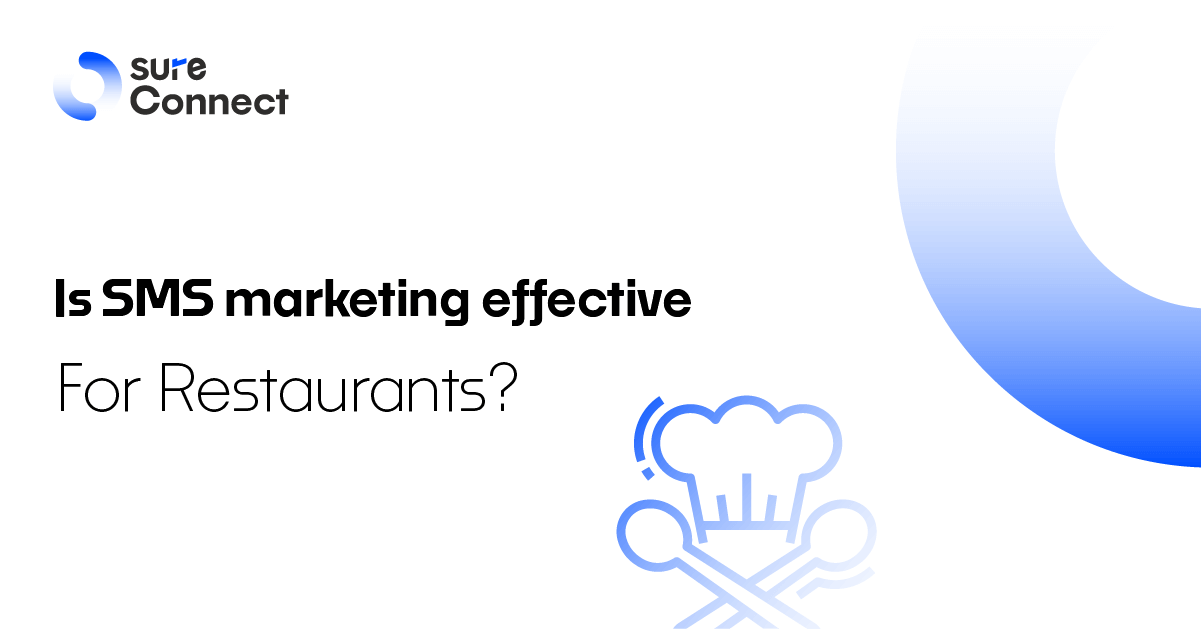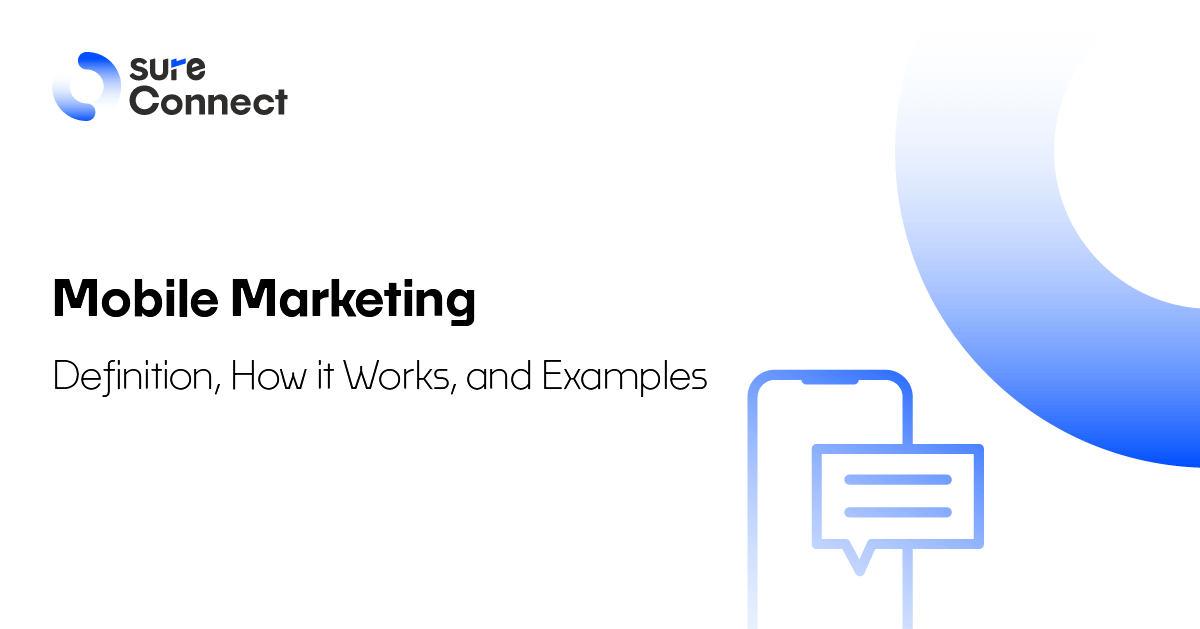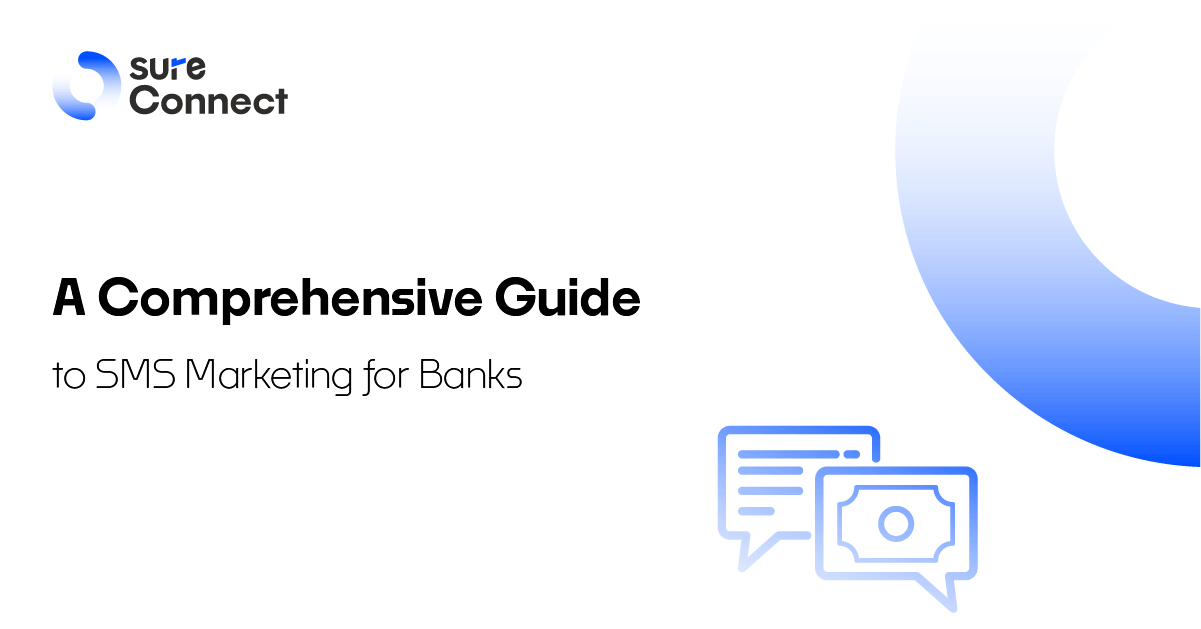Blogs
What is SMS Marketing?
SMS marketing is a strategy that involves sending short text messages to targeted customers to promote products and services or to communicate with them effectively and instantly.
What are the Benefits of SMS Marketing?
- Instant Communication: Messages reach customers in real time.
- Direct Interaction: Customers can easily respond to messages.
- Low Cost: Less expensive compared to other marketing channels like TV ads.
- High Open Rate: Most SMS messages are opened and read within minutes.
How Can I Improve the Effectiveness of My SMS Marketing Campaigns?
- Personalize messages to suit the interests of your target audience.
- Use clear and simple language.
- Include a clear call-to-action (CTA).
- Regularly analyze results to improve performance.
What Types of Messages Can Be Sent?
- Promotional Messages: Such as discounts and offers.
- Reminder Messages: For appointments or pending invoices.
- Customer Service Messages: To respond to customer inquiries.
- Follow-Up Messages: For customer feedback after a purchase.
How Can I Collect Customer Phone Numbers Effectively?
- Provide easy-to-fill registration forms on your website.
- Offer incentives like discounts for sharing their phone numbers.
- Use social media campaigns to encourage registration.
- Add an option to share phone numbers during checkout.
What are the Challenges of SMS Marketing?
- Customer Consent: Ensure customers agree to receive messages.
- Repetitive Messaging: Over-messaging may annoy customers.
- Legal Compliance: Adhere to privacy and data protection regulations.
Are There Character Limitations for SMS Messages?
Yes, an SMS message is typically limited to 160 characters, requiring concise and effective content.
How Can I Measure the Success of SMS Campaigns?
- Open Rate: Percentage of customers who opened the message.
- Response Rate: Number of customers who took action after reading the message.
- Conversion Rate: Number of customers who completed the desired action.
- Link Analysis: Number of clicks on links included in messages.
Can SMS Services Be Integrated with Other Systems?
Yes, SMS marketing can be integrated with Customer Relationship Management (CRM) systems and email marketing platforms to enhance customer engagement.
What Are Best Practices for SMS Marketing?
- Provide an opt-in or opt-out option for customers.
- Send messages at appropriate times.
- Ensure the content delivers value to customers.
- Maintain transparency in the provided information.
What Are the Legal Regulations for SMS Marketing?
- Respect customer privacy by adhering to data protection laws.
- Obtain customer consent before sending messages.
- Include company contact information in the messages.
How Can I Improve SMS Response Rates?
- Use attractive phrases to encourage customer interaction.
- Personalize messages based on customer preferences and buying behavior.
- Offer exclusive deals through SMS.
What Is the Best Time to Send SMS Messages?
- During working hours (9 AM to 6 PM) for maximum engagement.
- Avoid late-night or early-morning messages to prevent customer annoyance.
What Are the Common Mistakes to Avoid in SMS Marketing?
- Sending non-targeted messages to a general audience.
- Writing long and unclear content.
- Failing to provide an unsubscribe option.
- Ignoring campaign results and not analyzing performance.
What Are the Use Cases of SMS Marketing in Different Sectors?
- Healthcare: Reminding patients of appointments.
- Retail: Promoting new offers and discounts.
- Education: Updating students and parents with news.
- Tourism: Sending trip details and promotional offers.
Can SMS Marketing Be Used to Build Brand Loyalty?
Yes, you can enhance loyalty by sending thank-you messages, exclusive offers for premium members, and personalized updates about customer activity.
How Can I Ensure Quality in SMS Messages?
- Proofread to ensure messages are error-free.
- Use engaging and innovative templates.
- Test messages before sending to ensure all links and content are accurate.
Is SMS Marketing Popular in the Saudi Market?
SMS marketing is one of the most effective marketing tools in Saudi Arabia due to high message open rates and customer preference for this instant communication channel.
What Are the Most Responsive Demographics to SMS Marketing in Saudi Arabia?
- Youth actively using mobile phones daily.
- Online shoppers.
- Customers looking for exclusive discounts and offers.
Is SMS Marketing Legally Permissible in Saudi Arabia?
Yes, SMS marketing is allowed, provided businesses comply with CITC (Communications and Information Technology Commission) regulations, such as:
- Obtaining customer consent before sending messages.
- Providing a clear opt-out option.
How Can Businesses Attract Customers in Saudi Arabia with SMS Marketing?
- Customize offers to fit local market needs and preferences.
- Use Arabic (formal or colloquial) depending on the audience.
- Focus on local occasions like National Day, Ramadan, or Hajj season.
Which Sectors Use SMS Marketing Most in Saudi Arabia?
- E-commerce: For promotional alerts.
- Healthcare: Appointment reminders.
- Banking: Updates on transactions and account status.
- Education: Parent and student communications.
- Travel and Tourism: Special promotional offers.
What Are the Legal Challenges in Using SMS Marketing in Saudi Arabia?
- Complying with CITC regulations.
- Ensuring data security and customer consent.
- Avoiding unsolicited messaging.
What Are the Key Occasions for SMS Marketing in Saudi Arabia?
- Saudi National Day.
- Ramadan and Eid seasons.
- Hajj and Umrah seasons.
- White Friday (Black Friday equivalent).
What Are the Top SMS Gateway Providers in Saudi Arabia?
- STC Business: A leading SMS gateway provider for businesses.
- Zain Saudi Arabia: Comprehensive SMS marketing platform services.
- Mobily: Advanced bulk SMS service and campaign platform.
- Sure Connect: Specialized in bulk SMS marketing and SMS gateway solutions.
By integrating advanced SMS Marketing Platforms and adhering to local market preferences, businesses in Saudi Arabia can achieve remarkable results with their Bulk SMS Campaigns and enhance customer satisfaction through personalized Text Messaging Services.
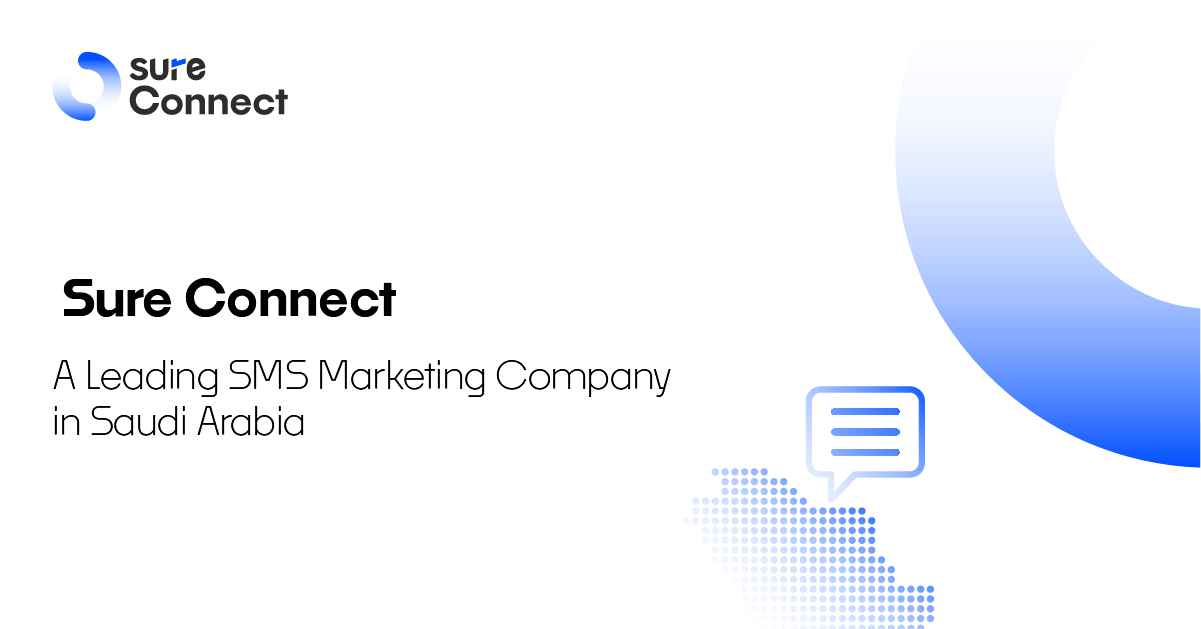
Sure Connect: A Leading SMS Marketing Company in Saudi Arabia
Sure Connect is one of the most prominent SMS marketing companies in Saudi Arabia, offering a comprehensive range of services aimed at enhancing communication between businesses and their customers. Here are some key aspects of their services:
1. Comprehensive SMS Marketing Services
- Customized SMS Design: Sure Connect enables users to design messages that reflect their brand identity, increasing customer engagement.
- Campaign Management: The platform offers advanced analytics tools to monitor campaign performance and optimize strategies for better results.
2. Wide Coverage and Technical Support
- Coverage of All Networks: Sure Connect’s services reach all networks in Saudi Arabia, ensuring messages are delivered to a broad audience.
- Continuous Technical Support: The support team is available to assist customers anytime, making the platform easy to use.
3. Ease of Use and Data Security
- User-Friendly Interface: The platform features an innovative interface that simplifies sending messages and managing campaigns effectively.
- Complete Security: Sure Connect protects customer data and messages using advanced encryption technologies, ensuring information safety.
4. Effective Communication Solutions
- Promotional SMS: Businesses can send special offers, discount notifications, and appointment reminders via SMS.
- Bulk SMS: Companies can easily communicate with a large audience through mass messaging.
With Sure Connect’s services, businesses in Saudi Arabia can enhance their customer communication and achieve marketing goals efficiently and quickly.
Best Practices for Maximizing Sure Connect's Potential
To maximize the benefits of Sure Connect's SMS marketing platform, here are some best practices that enhance campaign effectiveness and customer engagement:
1. Personalizing Messages
- Use Customer Names: Personalizing messages by adding customers’ names increases engagement and makes the message more appealing.
- Targeting Specific Audiences: Segment your audience into groups based on their interests and behaviors to send tailored messages suitable for each segment.
2. Analyzing Performance
- Track Results: Use the analytics tools available in Sure Connect to monitor campaign performance, such as open and click rates, to identify what works and what needs improvement.
- Adjust Strategies: Use data to refine future campaigns, such as modifying message timing or content type.
3. Timing Optimization
- Choose the Right Time: Send messages when your audience is most active to avoid them being lost in the day’s noise.
- Avoid Inconvenient Times: Refrain from sending messages late at night or during weekends when customer interaction might be lower.
4. Offering Promotions and Rewards
- Special Offers: Use Sure Connect to send promotional offers or exclusive discounts to encourage quick customer action.
- Interactive Contests: Organize SMS-based contests to increase engagement and brand loyalty.
5. Compliance with Standards
- Respect Customer Privacy: Ensure customers consent to receiving messages and provide an easy opt-out option.
- Adhere to Local Laws: Follow all regulations related to SMS marketing to avoid legal complications.
6. Utilizing API
- Seamless Integration: Use Sure Connect’s API to integrate SMS services with your existing systems, enhancing message sending efficiency.
- Customized Solutions: Develop tailor-made applications to meet your business-specific needs using the API.
By following these practices, businesses can fully leverage Sure Connect to enhance customer communication and achieve effective marketing results.
How Sure Connect Enhances App Quality
Sure Connect can improve app quality through effective strategies that enhance user experience and increase engagement. Here are some ways Sure Connect contributes to app quality improvement:
1. Enhancing User Experience
- Real-Time Communication: Use Sure Connect to send real-time notifications to users, enriching their experience with live updates or new features.
- Surveys: Send short surveys to gather user feedback on the app, helping developers understand their needs and expectations.
2. Data Analysis
- Behavioral Data Collection: Use Sure Connect to gather data on how users interact with the app, offering valuable insights to improve performance and functionality.
- Campaign Effectiveness Measurement: Advanced analytics tools can measure the impact of marketing campaigns linked to the app and their influence on user quality.
3. Personalization and Engagement
- Customized Messages: Send personalized SMS tailored to user interests, increasing their interaction with the app and enhancing loyalty.
- Special Offers: Offer discounts or exclusive deals via SMS to motivate users to use the app frequently.
4. System Integration
- CRM Integration: Integrate Sure Connect with Customer Relationship Management (CRM) systems for a seamless and unified user experience.
- Streamlined Support Operations: Provide direct communication channels for users, improving response times for issues and inquiries.
5. SMS Marketing Strategy Enhancement
- Targeted SMS Marketing Strategies: Design campaigns that align with your audience’s interests and preferences, improving message effectiveness and conversion rates.
- Automated Campaigns: Automate marketing campaigns to save time and ensure timely delivery of important messages.
By implementing these strategies, Sure Connect can elevate app quality and boost user engagement, leading to increased customer satisfaction and business success.
How Sure Connect Can Improve Customer Interaction Rates
Sure Connect can effectively enhance customer interaction rates through a range of integrated strategies. Here’s how the platform boosts engagement:
1. Using Personalized Messages
- Content Personalization: Send messages tailored to customer interests, significantly increasing engagement. Messages that include the customer’s name or preferences are more captivating.
- Broadcast Lists: Create lists for sending group messages targeted at specific customer segments, ensuring effective outreach.
2. Performance Analysis
- Advanced Analytics Tools: Sure Connect offers tools to analyze campaign performance, helping businesses understand customer behavior and improve strategies based on extracted data.
- Identify Strengths and Weaknesses: Use these analyses to pinpoint strong and weak points in campaigns and adjust accordingly.
3. Multi-Channel Communication
- Integrating SMS and WhatsApp: The platform enables multi-channel usage, such as SMS and WhatsApp, to reach a broader audience and increase interaction opportunities. This variety in communication caters to diverse customer needs.
4. Targeted Marketing Strategies
- Customized Campaigns: Design marketing campaigns targeting audience interests and preferences, increasing message relevance and conversion rates.
- Relevant Campaigns: Targeted campaigns are more meaningful to customers, leading to higher engagement.
5. Improving Customer Experience
- Immediate Support: Use WhatsApp to provide instant support, enhancing customer experience and encouraging interaction with the brand.
- Integrated Experience: Offer a rich and personalized experience to each customer, building stronger relationships.
6. Quick Responses
- Prompt Feedback: Use SMS for quick customer responses, facilitating effective communication and boosting interaction rates.
By following these strategies, Sure Connect can enhance customer interaction and deliver positive results in marketing campaigns.
How Sure Connect Helps Manage Marketing Campaigns from One Platform
Sure Connect simplifies marketing campaign management by providing multiple features, making it easier for businesses to improve strategies and increase communication efficiency. Here are the key benefits and features offered by this platform:
1. Centralized Channel Management
- Unified Channels: Sure Connect allows the management of marketing campaigns across multiple channels such as SMS and WhatsApp from a single platform, saving time and effort in coordinating different channels.
- Easy Access: Users can access all marketing tools in one place, simplifying planning and execution.
2. Campaign Automation
-
Automated Messaging: The platform enables automated message delivery, helping businesses save time and reduce human errors. Messages can be scheduled to be sent at specific times to ensure optimal delivery.
-
Effective Campaign Management: Multiple campaigns can be set up easily, allowing marketers to focus on strategies rather than manual processes.
3. Advanced Analytics
- Performance Metrics: Sure Connect provides advanced tools to monitor campaign performance, helping businesses understand how customers interact with messages and adjust strategies based on extracted data.
- Detailed Reports: Companies can obtain comprehensive reports on campaign performance, aiding in data-driven decision-making.
4. Ease of Use
- Simple Interface: Sure Connect’s user interface is designed to be intuitive, allowing users of all technical levels to set up and manage campaigns efficiently.
- Continuous Support: The technical support team is available to assist users anytime, ensuring uninterrupted campaigns.
5. Enhanced Customer Interaction
- Personalized Messages: Design SMS that reflect the brand’s identity, enhancing interaction with customers and building long-term relationships.
- Exclusive Offers and Alerts: The platform can be used to send special offers and instant alerts to customers, increasing engagement opportunities and customer loyalty.
By leveraging Sure Connect’s SMS marketing capabilities, businesses can manage their marketing campaigns more effectively and efficiently from one platform, contributing to achieving their marketing goals and improving customer interaction.
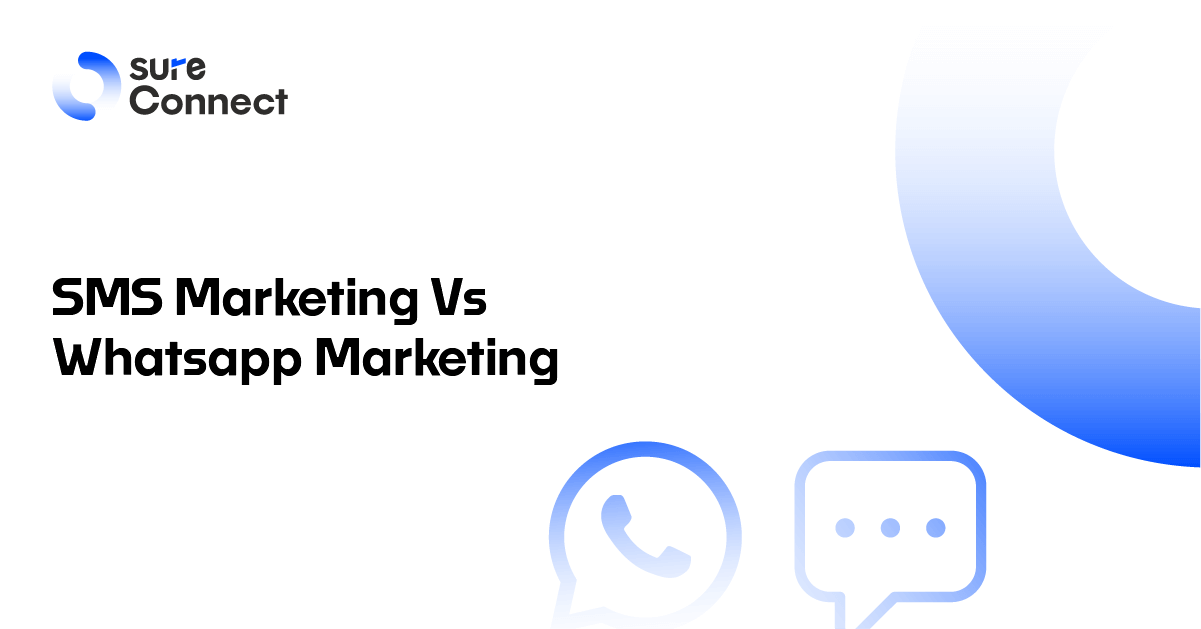
SMS marketing vs WhatsApp marketing
Comparison of SMS Marketing and WhatsApp Marketing
Both SMS marketing and WhatsApp marketing are effective channels for reaching customers, but they differ significantly in features, engagement, and overall effectiveness. Here’s a detailed comparison:
Key Features
| Feature | WhatsApp Marketing | SMS Marketing |
|---|---|---|
| Character Limit | Up to 4,096 characters | 160 characters |
| Multimedia Support | Supports images, videos, audio, documents | Primarily text; multimedia via MMS only |
| User Engagement | High engagement with interactive features | Lower engagement; primarily text-based |
| Cost Structure | Free to send messages (internet required) | Costs per message sent |
| Global Reach | Over 2 billion users globally | Limited by regional carrier restrictions |
| Open Rates | Approximately 99% | Around 91% |
| Security | End-to-end encryption | Vulnerable to interception |
Advantages of WhatsApp Marketing
- Rich Media Capabilities: Allows businesses to send diverse content types—images, videos, and documents—enhancing visual appeal and engagement.
- Higher Engagement Rates: Messages via WhatsApp have significantly higher click-through rates (CTR).
- Interactive Features: Supports buttons for quick replies and other interactive elements.
- Cost-Effective Communication: Operates on a per-conversation model, allowing continuous interaction within a 24-hour window.
- Global Accessibility: Facilitates communication across borders without SMS restrictions.
Advantages of SMS Marketing
- Simplicity and Directness: Effective for delivering concise messages quickly.
- Widespread Compatibility: Can reach any mobile phone without the need for an app or internet connection.
- No Approval Needed: Unlike WhatsApp, SMS does not require template approval for marketing messages.
How can rich media be integrated into SMS marketing campaigns?
- Use of Short Links: Deliver rich media through short links directing recipients to landing pages.
- Rich Media Messaging (RMM): Include various content types like images, videos, and surveys.
- Incorporate Multimedia Content: Add images, videos, GIFs, or audio clips to make messages engaging.
- Interactive Elements: Use buttons, polls, or QR codes to increase engagement.
- Utilize Rich Communication Services (RCS): Send high-resolution media and enable two-way communication.
- Personalized Landing Pages: Create tailored pages linked from SMS messages for enhanced relevance.
- Integration with Other Channels: Combine SMS with email and social media for a cohesive strategy.
How can rich media in SMS improve customer retention rates?
- Enhanced Engagement: Captures attention and encourages interaction.
- Improved Customer Experience: Provides visually appealing and informative content.
- Personalization Opportunities: Tailored content increases loyalty.
- Higher Conversion Rates: Boosts sales and reinforces positive buying experiences.
- Immediate Feedback and Interaction: Includes surveys or reply buttons for real-time feedback.
- Building Brand Loyalty: Delivers memorable and engaging content to strengthen customer relationships.
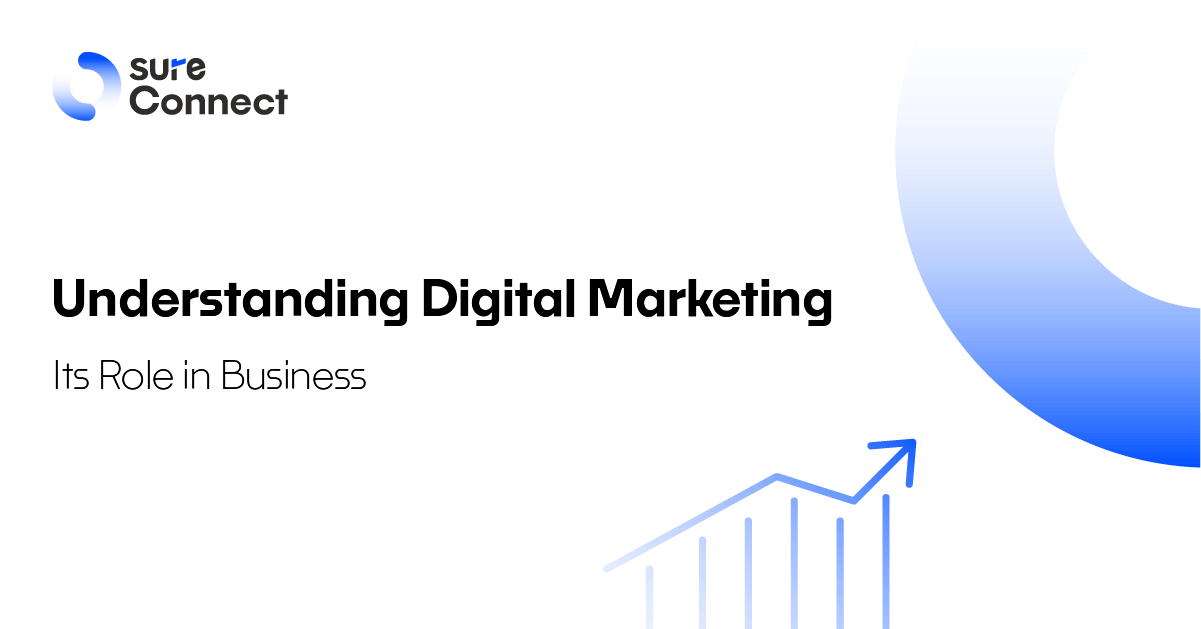
Understanding Digital Marketing and Its Role in Business
Digital Marketing and Business
Digital marketing has transformed the landscape of business promotion and customer engagement. By leveraging various digital channels, businesses can effectively reach their target audiences, enhance brand visibility, and drive sales. This article explores the fundamental aspects of digital marketing, its types, challenges, and its significance in modern business strategies.
What is Digital Marketing?
Digital marketing encompasses the use of digital platforms such as websites, social media, email, and search engines to promote products and services. Unlike traditional marketing methods, which rely on print or broadcast media, digital marketing allows for more interactive and measurable campaigns. The rise of the internet in the 1990s marked the beginning of this evolution, enabling businesses to engage with consumers in real-time and gather valuable data about their preferences and behaviors.
Key Components of Digital Marketing
Digital marketing integrates several strategies and channels to create a comprehensive approach. Some of the most common components include:
- Website Marketing: A business's website serves as a central hub for its digital marketing efforts. It should be user-friendly, fast-loading, and optimized for mobile devices.
- Content Marketing: This strategy focuses on creating valuable content that informs or entertains potential customers. High-quality content can improve brand awareness and establish authority in a particular niche.
- Email Marketing: Despite being one of the oldest forms of digital marketing, email remains highly effective. It allows businesses to communicate directly with customers and nurture leads through targeted campaigns.
- Social Media Marketing: Platforms like Facebook, Instagram, and Twitter enable businesses to build relationships with their audience, promote products, and drive traffic to their websites.
- Search Engine Optimization (SEO): SEO involves optimizing a website to rank higher in search engine results pages (SERPs), increasing visibility and attracting organic traffic.
- Affiliate Marketing: This performance-based strategy involves partnering with influencers or other businesses to promote products in exchange for a commission on sales generated through their referrals.
Challenges in Digital Marketing
While digital marketing offers numerous advantages, it also presents unique challenges:
- Oversaturation: The digital space is crowded with advertisements, making it difficult for brands to stand out. Marketers must find innovative ways to capture consumer attention amidst the noise.
- Rapidly Evolving Technology: The digital landscape is constantly changing, requiring marketers to stay updated on new tools, platforms, and trends.
- Data Management: With the ability to collect vast amounts of data comes the challenge of analyzing it effectively to inform marketing strategies.
The Importance of Content Writing in Digital Marketing
Content writing plays a pivotal role in digital marketing by helping businesses connect with their audience. Here are several key functions:
- Building Brand Awareness: Well-crafted content can educate potential customers about a brand's offerings while establishing a memorable presence in their minds.
- Establishing Authority: High-quality content positions a brand as an expert in its field, fostering trust among consumers.
- Enhancing SEO: Content that includes relevant keywords can improve search engine rankings, driving more traffic to a website.
- Increasing Conversion Rates: Engaging content with clear calls-to-action (CTAs) encourages users to take desired actions, such as signing up for newsletters or making purchases.
Digital marketing is an essential component of modern business strategy. By utilizing various digital channels effectively—especially through high-quality content—businesses can enhance their reach, engage consumers meaningfully, and ultimately drive growth. As technology continues to evolve, staying informed about best practices and emerging trends will be crucial for success in this dynamic field.
Latest Trends in Digital Marketing for 2024
The digital marketing landscape is continuously evolving, and 2024 is set to witness several key trends that will shape how businesses engage with consumers. Here are the most significant trends identified from recent analyses:
- Privacy-Centric Marketing: With increasing concerns over data privacy, brands are adopting privacy-centric approaches. This involves transparent data collection practices and prioritizing consumer consent, which not only complies with regulations but also builds trust with users.
- Short-Form Video Content: Platforms like TikTok and Instagram Reels have popularized short-form videos, making them a primary medium for storytelling and product promotion. In 2024, brands will focus on mastering this format to enhance engagement and connect with audiences more effectively.
- Artificial Intelligence (AI): AI continues to revolutionize digital marketing by enhancing productivity through tools for content creation, customer data analysis, and personalized marketing strategies. The integration of AI is expected to increase in areas such as chatbots for customer service and automated marketing campaigns.
- User-Generated Content (UGC): UGC is becoming a vital component of brand strategies, as it helps build authenticity and trust. Brands will increasingly leverage content created by their customers to enhance engagement and brand loyalty.
- Social Commerce: The rise of social commerce allows consumers to purchase products directly through social media platforms. This trend will continue to grow as brands integrate shopping features into their social media strategies, making the buying process more seamless.
- Augmented Reality (AR): AR technology is set to transform online shopping experiences by allowing consumers to visualize products in real-world settings before purchasing. This interactive approach enhances consumer decision-making and engagement.
- Full-Funnel Marketing Strategies: As consumer journeys become more complex, marketers are adopting full-funnel strategies that address all stages of the buying process. This includes multi-channel approaches that ensure consistent messaging across various platforms.
- Conversational Marketing: The use of chatbots and AI assistants for real-time customer interaction is gaining traction. These tools improve customer service and lead generation by providing instant responses to inquiries.
- Enhanced SEO Strategies: With the evolution of search engines, SEO strategies are expanding beyond traditional text-based searches to include video, image, and voice search optimization. This shift requires marketers to adapt their content strategies accordingly.
- Ethics in Digital Marketing: As consumers become more aware of ethical considerations, brands are focusing on inclusive marketing practices that resonate with diverse audiences while promoting transparency in their operations.
The digital marketing trends for 2024 emphasize the importance of privacy, personalization, and interactivity in engaging consumers effectively. By adapting to these trends, businesses can enhance their marketing strategies, foster deeper connections with their audiences, and ultimately drive growth in an increasingly competitive digital environment.
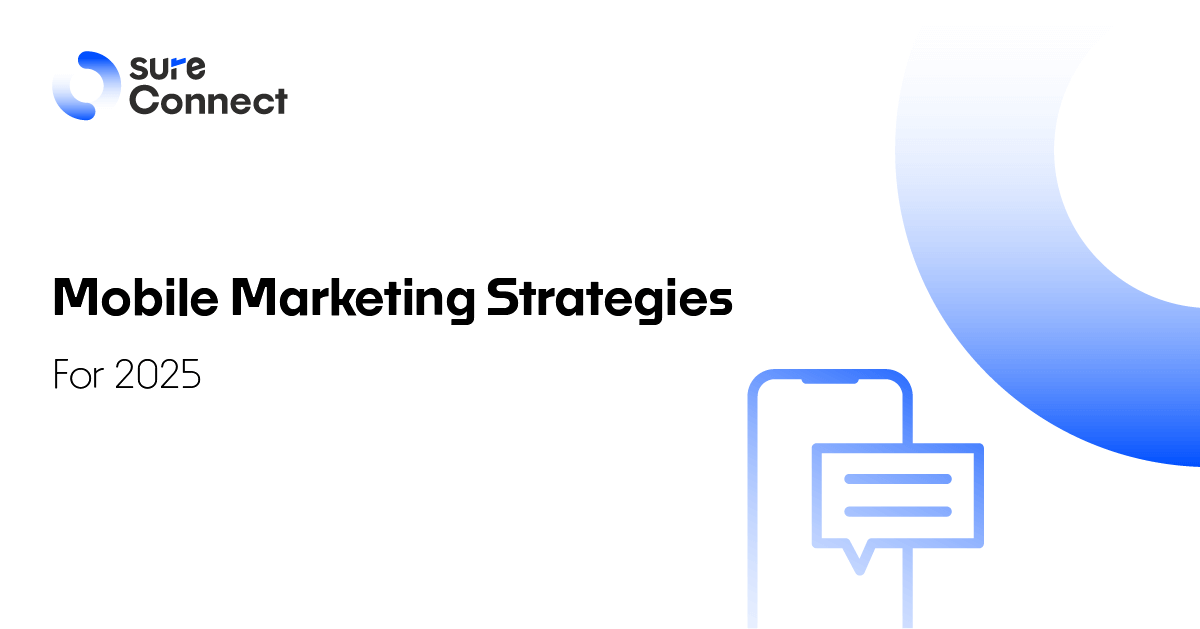
What are the most effective mobile marketing strategies for 2025?
In 2025, mobile marketing strategies will evolve significantly, driven by advancements in technology and changing consumer behaviors. Here are the most effective strategies to consider:
Key Mobile Marketing Strategies for 2025
AI-Driven Personalization
Leveraging artificial intelligence to create highly personalized advertising experiences will be crucial. AI can analyze user behavior and preferences in real time, allowing brands to serve tailored messages that resonate with individual users.
Enhanced SMS Marketing
SMS marketing will continue to be a powerful tool, especially with AI enhancements that allow for predictive and behavior-based messaging. High open rates and immediate engagement make this channel effective for promotions and alerts.
Social Media Marketing
Social media platforms will remain central to mobile marketing, particularly as they evolve with AI algorithms. Brands should focus on creating engaging video content tailored to platforms like TikTok and Instagram, utilizing both organic posts and targeted ads.
Location-Based Marketing The integration of AI in geotargeting will allow brands to deliver contextually relevant ads based on real-time location data and user behavior. This strategy enhances engagement by providing timely offers to users in specific locations.
Proximity Marketing
With advancements in 5G technology, proximity marketing will improve through faster and more accurate ad delivery via Bluetooth and other technologies. This method can effectively drive foot traffic to physical locations.
In-App Marketing In-app
advertising will expand beyond traditional formats, utilizing immersive experiences powered by AI and 5G. This includes display ads, native ads, video ads, and interstitials that engage users within their favorite apps.
Video Advertising
Video content will dominate mobile marketing due to its high engagement rates. Brands should focus on short-form videos that capture attention quickly, ensuring clear messaging and strong calls to action.
Influencer Marketing
Collaborating with nano- and micro-influencers will become increasingly effective as these influencers foster genuine connections with niche audiences. This strategy enhances brand trust and drives meaningful engagement through authentic endorsements.
Voice Search Optimization
As voice assistants become more prevalent, optimizing mobile content for voice search will be essential for reaching users effectively in 2025.
User-Generated Content (UGC) Encouraging authentic user-generated content will help brands connect with consumers on a personal level. Campaigns that promote sharing experiences can enhance community building and brand loyalty.
By adopting these strategies, brands can effectively engage their audience in the rapidly evolving mobile landscape of 2025, ensuring they remain competitive and relevant in the market.
What are the benefits of using AI-driven personalization in mobile marketing?
AI-driven personalization in mobile marketing offers several significant benefits that enhance customer engagement, satisfaction, and overall marketing effectiveness. Here are the key advantages:
Key Benefits of AI-Driven Personalization in mobile marketing
Enhanced Customer Experience
AI allows brands to deliver tailored experiences by analyzing user data such as browsing history, preferences, and interactions. This results in personalized content and recommendations that resonate with individual users, fostering a more engaging experience.
Increased Engagement
Personalized marketing messages and recommendations encourage users to interact more with apps and content. For instance, when users receive suggestions based on their past behaviors or preferences, they are more likely to explore further, leading to longer session durations and higher engagement rates.
Improved Conversion Rates
By providing highly relevant suggestions that align with user intent, AI-driven personalization significantly boosts conversion rates. Users are more likely to make purchases or engage with content that feels directly relevant to them, enhancing the effectiveness of marketing campaigns.
Stronger Customer Loyalty
Personalization helps create deeper emotional connections between brands and consumers. When customers feel understood and valued through tailored interactions, they are more likely to develop loyalty towards the brand, leading to repeat purchases and advocacy.
Real-Time Adaptability
AI systems can analyze user behavior in real-time, allowing brands to adjust their marketing strategies dynamically. This adaptability ensures that the content remains relevant and timely, aligning with shifting consumer preferences and behaviors.
Data-Driven Insights
AI-driven personalization generates valuable insights into customer behavior and preferences. Brands can leverage this data to refine their marketing strategies, optimize product offerings, and identify emerging trends, ultimately enhancing decision-making processes.
Cost Efficiency
By targeting specific customer segments with personalized messages, brands can minimize wasted ad spend and improve campaign efficiency. This precision targeting leads to better allocation of marketing budgets and higher return on investment (ROI).
Scalability AI-powered
personalization can handle vast amounts of data and user interactions simultaneously without compromising performance. This scalability allows businesses to provide individualized experiences to millions of users effectively.
AI-driven personalization is transforming mobile marketing by enabling brands to connect with consumers on a more personal level, enhancing engagement, loyalty, and overall marketing performance while driving better business outcomes.
What are some real-world examples of AI personalization in mobile marketing?
AI-driven personalization is increasingly being utilized in mobile marketing
with several brands successfully implementing strategies that enhance user engagement and conversion rates. Here are some real-world examples:
Domino’s Domino’s
uses targeted mobile push notifications to promote deals based on customers' previous orders. By personalizing offers according to individual order history and sending notifications at optimal times, Domino's has significantly increased engagement and sales.
Starbucks
The Starbucks mobile app personalizes user experiences by analyzing data such as location and purchase history. This enables the app to offer tailored product recommendations and promotions, enhancing customer loyalty and increasing order frequency.
Spotify
Spotify employs AI to send personalized notifications about new releases from artists that users have recently discovered. This strategy not only encourages users to engage with new content but also increases their overall time spent in the app.
Uber Eats
Uber Eats sends personalized mobile push notifications that highlight nearby restaurants offering deals based on the customer's preferences and location. This targeted approach helps drive conversions by connecting users with relevant dining options at the right time.
Amazon
Amazon utilizes AI-driven recommendation engines that analyze browsing and purchase histories to suggest products tailored to individual users. This personalization enhances the shopping experience and increases the likelihood of additional purchases.
Netflix
Netflix’s recommendation system analyzes viewing habits to suggest content that aligns with user preferences, significantly contributing to user engagement and retention. Approximately 80% of content streamed on Netflix is driven by its personalized recommendations.
Sephora
Sephora uses AI technology in its mobile app to provide personalized product recommendations based on customer preferences and purchase history. Additionally, its "Virtual Artist" feature allows users to virtually try on products, enhancing the shopping experience through personalization.
Adidas
Adidas implemented AI-driven personalization on its mobile platform by creating targeted coupon codes and optimizing site navigation based on user behavior. This resulted in significant increases in average order value (AOV) and conversion rates.
These examples illustrate how AI-driven personalization can effectively enhance customer interactions, leading to increased engagement, loyalty, and sales across various industries in mobile marketing.
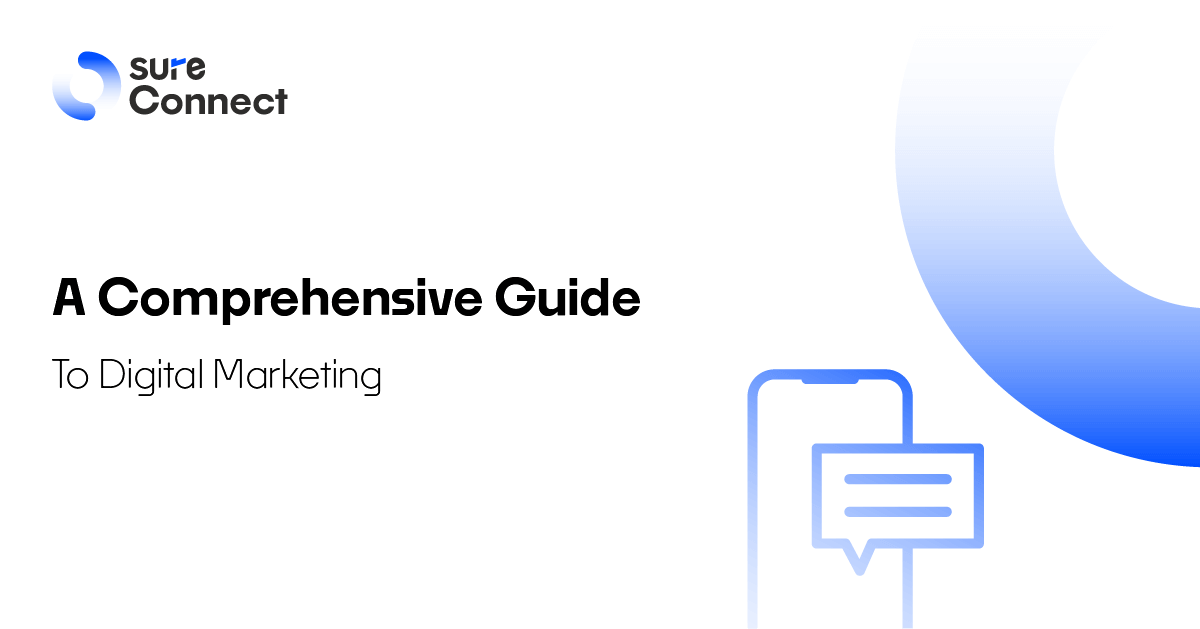
A Comprehensive Guide to Digital Marketing and the Importance of Mobile Marketing
Digital marketing has become one of the most prominent tools companies use to engage with customers and boost sales. Mobile marketing, in particular, is an integral part of digital marketing, offering easy access to customers anytime, anywhere. In this article, we will explore the fundamentals of digital marketing, mobile marketing strategies, as well as their advantages and disadvantages, accompanied by practical examples.
The Fundamentals of Digital Marketing
What is Digital Marketing?
Digital marketing involves using digital tools such as the internet, social media, and email to promote products and services. It is one of the most efficient ways to reach a target audience and achieve business goals.
Key Digital Marketing Strategies
-
Search Engine Optimization (SEO): Improving a website’s visibility in search engines.
-
Content Marketing: Creating engaging content like blogs and videos to attract customers and build trust.
-
Social Media Marketing: Leveraging platforms like Facebook and Instagram to reach targeted audiences.
-
Email Marketing: Sending personalized messages to current and potential customers.
Mobile Marketing
Defining Mobile Marketing
Mobile marketing is a digital marketing strategy focused on targeting customers through smartphones. It involves using SMS (short message service), app notifications, or in-app advertisements.
Why Mobile Marketing?
-
Easy Access: Mobile phones are used daily, making it faster and more efficient to reach customers.
-
Instant Interaction: Through notifications and text messages, companies can engage with their audience in real-time.
-
Cost-Effectiveness: Compared to traditional advertising, mobile marketing is less expensive and highly targeted.
Mobile Marketing Strategies
Key Mobile Marketing Strategies
-
SMS Marketing: A direct and effective tool for promotions and reminders.
-
In-App Advertising: Reaching specific audiences through ads displayed within popular apps.
-
Push Notifications: Alerting customers about offers or updates to increase brand interaction.
-
Mobile Game Advertising: Engaging younger audiences with innovative ads within gaming environments.
Advantages and Disadvantages of Mobile Marketing
Advantages of Mobile Marketing
-
Direct Access: Interact with customers anytime and anywhere.
-
Higher Conversion Rates: Mobile-targeted campaigns generally yield stronger results.
-
Personalization: Tailor messages to customers’ interests.
-
Cost-Effective: More economical compared to traditional advertising.
Disadvantages of Mobile Marketing
-
Intrusive Ads: Poorly targeted messages can annoy customers.
-
Technical Challenges: Issues like weak internet connections or incompatible devices may occur.
-
Privacy Concerns: Customer worries about personal data protection can affect campaign success.
Successful Examples of Mobile Marketing
-
Interactive App Ads: Companies like Nike use app notifications to boost engagement with seasonal promotions.
-
Mobile Game Marketing: Coca-Cola incorporates innovative ads into games to attract younger audiences and enhance brand awareness.
-
SMS Marketing: Retailers like Carrefour send exclusive offers via SMS, increasing store traffic and sales.
How to Get Started with Digital and Mobile Marketing
Steps to Begin in Digital Marketing
-
Learn the Basics: Take a free digital marketing course to understand fundamental concepts.
-
Identify Your Target Audience: Focus on groups aligned with your products or services.
-
Choose the Right Tools: Use analytics tools like Google Analytics and SEMrush to improve performance.
Steps to Begin in Mobile Marketing
-
Mobile-Responsive Website: Ensure your site is optimized for mobile devices.
-
Analytics Tools: Use platforms like Firebase to analyze campaign performance.
-
Develop Effective Apps: Create apps that meet customer needs and enhance engagement.
In conclusion, Digital marketing, and especially mobile marketing, has become essential for success in today’s business landscape. By employing effective strategies—like SMS, app notifications, and in-game advertising—companies can reach wider audiences and foster stronger customer loyalty. To achieve lasting success, businesses must invest in the right technology and continuously analyze customer data to refine their strategies over time.
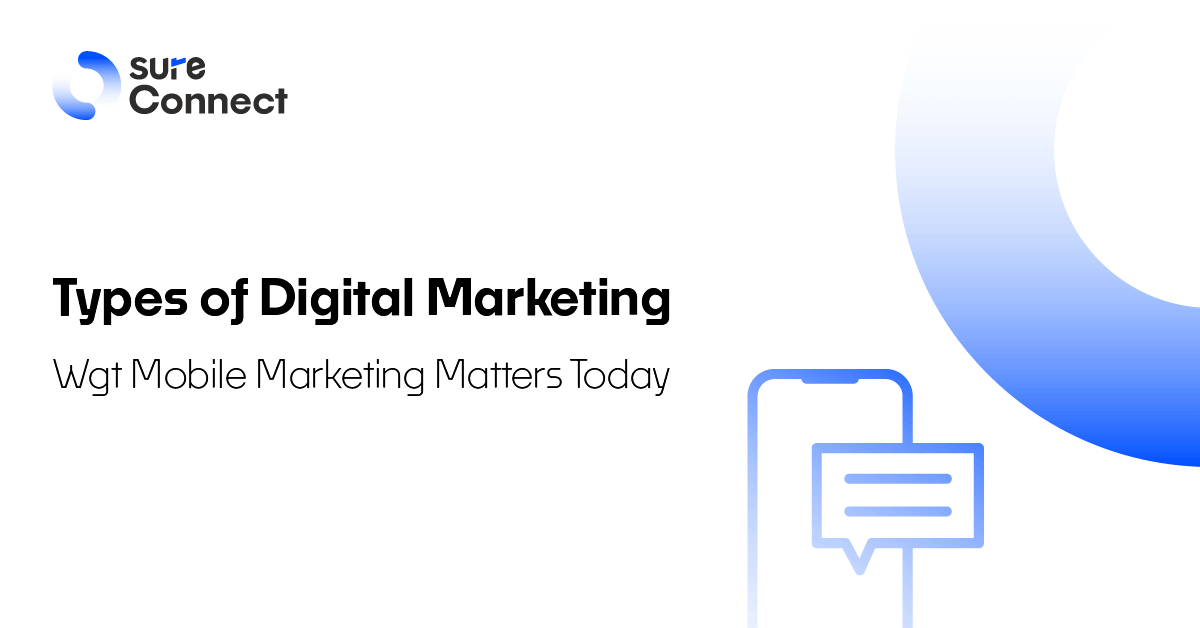
Types of Digital Marketing and Why Mobile Marketing Matters Today
Types of digital marketing have expanded rapidly, transforming how businesses connect with their audiences. No longer limited to traditional channels, brands must now understand the fundamentals of digital marketing, grasp what is seo in digital marketing, and consider taking a free digital marketing course to refine their skills. As smartphones become integral to everyday life, the importance of mobile marketing emerges as a key factor in reaching consumers wherever they go.
This article offers practical insights and strategies to help you navigate this ever-changing landscape. You will learn how to start digital marketing, discover how to do digital marketing effectively, explore mobile marketing examples, and understand how to craft a solid mobile marketing strategy. By the end, you will have a clearer perspective on blending creativity, data-driven decision-making, and technological innovation to achieve meaningful results in a digitally connected world.
Building a Strong Foundation with the Fundamentals of Digital Marketing
Before diving into advanced techniques, it’s crucial to master the fundamentals of digital marketing. A sturdy foundation ensures that every subsequent step is taken with confidence and clarity.
Understanding What is SEO in Digital Marketing to Enhance Visibility
To stand out in a crowded marketplace, brands need to know what is seo in digital marketing. Search Engine Optimization (SEO) is not just about keywords—it's about creating high-quality, relevant content and ensuring a seamless user experience on your website. By choosing the right terms your audience is searching for, improving page loading speeds, and crafting informative copy, you increase your chances of ranking higher in search results. Over time, these efforts attract organic traffic, bringing visitors who are genuinely interested in what you offer.
How to Start Digital Marketing with Clear Goals
If you’re wondering how to start digital marketing, begin by setting specific, measurable objectives. Do you aim to increase brand awareness, generate leads, or boost sales? Identifying your priorities will guide your choice of channels—such as search, social media, or email—and shape the type of content you produce. Having well-defined goals keeps you focused and ensures that your campaigns deliver tangible outcomes.
How to Do Digital Marketing for Sustainable Growth
Figuring out how to do digital marketing effectively often involves experimentation. Test different ad formats, content types, and posting schedules. Use analytics tools to measure performance and identify what resonates with your audience. Over time, refine your approach, invest in what works, and phase out what doesn’t. This iterative process leads to sustained growth rather than short-term gains.
Taking a Free Digital Marketing Course to Gain Practical Skills
Enrolling in a free digital marketing course can be a game-changer for beginners and experienced marketers alike. These courses often cover SEO best practices, social media strategies, and email marketing fundamentals. By learning from experts, you can quickly adopt industry standards, avoid common pitfalls, and gain hands-on experience with tools and platforms that streamline your operations.
Applying Knowledge in Real-World Scenarios
After completing any training, apply what you’ve learned to real projects. Start small—maybe optimize blog posts for SEO or run a trial ad campaign. As you see results, scale up your efforts. Over time, the blend of theoretical knowledge and practical experience builds confidence and hones your decision-making skills.
Continual Analysis and Improvement
The digital space never stands still. Trends shift, algorithms change, and audience preferences evolve. Regularly review your analytics, stay up-to-date with industry news, and refine your tactics. This commitment to ongoing improvement ensures your marketing efforts remain effective in the long run.
Crafting a Mobile Marketing Strategy for a Smartphone-Driven World
Smartphones have revolutionized how people interact with brands, making a mobile marketing strategy essential. By focusing on mobile-friendly experiences, you can reach customers in the palm of their hand, literally.
Mobile Marketing Examples to Inspire Your Approach
Mobile marketing examples abound in today’s marketplace. Some businesses send personalized SMS offers to customers who are near their store locations. Others use push notifications to remind app users of items left in their shopping carts. Interactive ads in mobile games or location-based promotions via GPS are also popular. These varied approaches highlight the flexibility and creativity that mobile channels offer.
Consulting a Mobile Marketing Magazine for Latest Trends
Staying current with trends is easier when you refer to a mobile marketing magazine. Such publications provide in-depth analyses, case studies, and expert interviews that help you understand emerging tools and consumer behaviors. This knowledge ensures you don’t rely on guesswork when refining your mobile strategy.
Mobile Marketing Advantages and Disadvantages: A Balanced View
Assessing mobile marketing advantages and disadvantages helps you make informed decisions. The immediate accessibility of mobile devices allows for timely, personalized messaging, which can boost engagement. However, there’s a risk of overwhelming users with too many notifications or encountering technical compatibility issues across different devices. Striking a balance is key—give your audience value without becoming intrusive.
Utilizing Mobile Marketing Tools for Better Performance
Various mobile marketing tools simplify tasks like campaign management and analytics. These platforms help you test different messaging strategies, target specific user segments, and measure performance in real-time. With the right tools, you can refine your messaging strategy and continuously improve user experiences.
Exploring Different Types of Mobile Marketing for Greater Reach
There are several types of mobile marketing to consider. Some brands focus on SMS marketing, delivering timely alerts to subscribers. Others invest in mobile apps that offer exclusive content, loyalty rewards, or convenient shopping experiences. In-app advertising, mobile-optimized websites, and mobile games also present unique opportunities. By diversifying your approach, you reach different audience segments, increasing the odds of meaningful engagement.
Advantages of Mobile Marketing for Customer Engagement
The advantages of mobile marketing are plentiful. You can harness location-based data to send relevant offers, use interactive content to captivate audiences, and benefit from the intimate relationship users have with their phones. This closer connection often leads to increased conversions, improved loyalty, and long-term value for both customers and brands.
Overcoming Obstacles and Leveraging Benefits in the Mobile Landscape
No strategy is free from challenges. Understanding potential drawbacks and responding proactively can safeguard your brand’s reputation and improve your campaigns’ effectiveness.
Which of the Following Was Not Listed as a Disadvantage of Mobile Marketing?
Common issues, like bombarding users with irrelevant messages or encountering technical glitches, often surface as key disadvantages. But you might wonder, which of the following was not listed as a disadvantage of mobile marketing? The key lies in perspective. Some perceived issues—like needing a stable internet connection—aren’t inherent disadvantages if addressed proactively. For example, optimizing content for low-bandwidth situations can turn a potential negative into a positive user experience.
Addressing Disadvantages of Mobile Marketing with Empathy
Disadvantages of mobile marketing might include user fatigue from constant alerts, privacy concerns, and the challenge of ensuring compatibility across devices. Combat these by respecting user preferences, providing clear opt-out options, and ensuring your content is genuinely helpful. Overcoming these hurdles turns potential negatives into opportunities to earn trust.
Benefits of Mobile Marketing When Handled Thoughtfully
The benefits of mobile marketing shine brightest when campaigns are considerate and user-focused. Timely, relevant offers improve customer satisfaction. Interactive content encourages active participation, and data-driven insights allow you to refine and enhance the user journey. A well-executed mobile campaign makes customers feel understood and valued, fostering loyalty.
Define Mobile Marketing for a Unified Vision
When you attempt to define mobile marketing, think of it as the practice of engaging consumers through their smartphones and tablets with personalized, context-relevant content. It’s about leveraging portability, connectivity, and convenience. This definition helps align your team around a cohesive vision and ensures everyone understands the broader objectives behind each campaign.
Which of These Has Led to the Evolution of Mobile Marketing?
Several factors drive the evolution of this field. If you ask which of these has led to the evolution of mobile marketing, look at technology advances like faster internet speeds, better device hardware, and smarter apps. Consumer behavior also plays a role, as people increasingly rely on their smartphones for everything from shopping to entertainment. These forces together shape a constantly evolving landscape, pushing brands to adapt and innovate.
Highlighting the Importance of Mobile Marketing and Advanced Applications
The growing reliance on smartphones has placed mobile at the center of modern marketing strategies. Ignoring this channel could mean missing out on valuable touchpoints with consumers.
Importance of Mobile Marketing in Staying Competitive
The importance of mobile marketing is clear—consumers spend hours daily on their devices. Being present on that screen means you can offer solutions, answer questions, and invite action at the right time. As competitors strive to carve out digital real estate, a well-executed mobile approach ensures your brand isn’t left behind.
Mobile App Marketing for a Tailored Experience
Mobile app marketing focuses on creating dedicated applications that enrich user experience. By offering exclusive content, personalized recommendations, or convenient shopping interfaces, your app can become a go-to resource for customers. This direct channel fosters loyalty and encourages repeat engagement, ultimately boosting retention and revenue.
Partnering with a Mobile App Marketing Agency for Expertise
If you lack internal resources, consider working with a mobile app marketing agency. These experts help develop, launch, and optimize your app campaigns. They understand user acquisition strategies, user interface best practices, and how to integrate analytics to measure success. Their specialized skills can accelerate your growth and free your team to focus on core business functions.
Mobile Game Marketing for Engaging Entertainment
Mobile game marketing leverages the popularity of mobile games to introduce your brand in a fun, interactive environment. Players already immersed in entertainment are often more receptive to creative ads, in-game rewards, or branded storylines. By integrating your brand seamlessly, you build positive associations and leave a memorable impression.
Mobile Affiliate Marketing for Expanding Your Network
Mobile affiliate marketing connects you with partners who promote your products or services in exchange for a commission. This model allows you to tap into new audiences without incurring large upfront costs. Affiliates with established followings can help extend your reach, bring in more leads, and boost conversions—all through mobile-centric campaigns.
In conclusion, from mastering the types of digital marketing to capitalizing on the importance of mobile marketing, today’s business environment rewards those who can adapt and innovate. By solidifying your understanding of the fundamentals of digital marketing, recognizing what is seo in digital marketing, and improving through a free digital marketing course, you lay the groundwork for success. Understanding how to start digital marketing and how to do digital marketing enables you to apply your knowledge strategically and refine it over time.
A well-planned mobile marketing strategy, inspired by mobile marketing examples and informed by insights from a mobile marketing magazine, helps you navigate the space with confidence. By weighing mobile marketing advantages and disadvantages, leveraging mobile marketing tools, and exploring various types of mobile marketing, you position yourself to make informed decisions. Recognizing the advantages of mobile marketing, understanding which of the following was not listed as a disadvantage of mobile marketing, and dealing with disadvantages of mobile marketing thoughtfully allows you to deliver value without alienating users.
As you define mobile marketing in a way that aligns with your brand’s mission, you can identify which of these has led to the evolution of mobile marketing and stay ahead of the curve. Embracing the importance of mobile marketing, investing in mobile app marketing or partnering with a mobile app marketing agency, and integrating mobile game marketing and mobile affiliate marketing into your ecosystem can broaden your reach and enhance customer loyalty.
Ultimately, success in the digital age lies in continuous learning, experimentation, and adaptation. Keep an eye on performance metrics, stay informed about industry trends, and trust the iterative process of improvement. With a solid strategic foundation and openness to new techniques, you can confidently navigate the digital landscape and strengthen your brand’s presence in an increasingly connected world.

